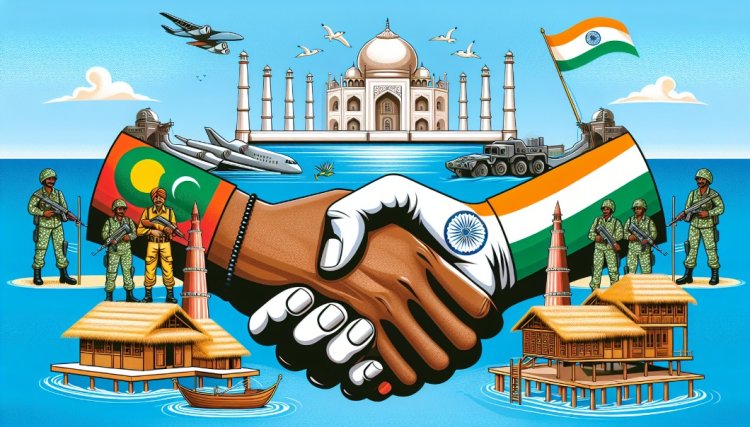Should we call the Maldives the most ungrateful nation?
"Explore the debate around labeling the Maldives as the most ungrateful nation. Delve into the reasons, controversies, and global perspectives on this contentious issue."

Introduction
In India, a famous saying is: "Don't make holes in the plate you eat from." This saying serves as a cautionary reminder not to jeopardise something vital. Currently, this saying is relevant to a situation involving three Maldivian officials. Their racist tweets target India's Prime Minister, Narendra Modi, and Indian tourists, putting the delicate recovery of the Maldives' tourism industry at risk.
The Maldives heavily relies on tourism, which significantly contributes to its GDP, employment, and foreign exchange earnings. However, the country has faced challenges in recent years due to external factors such as travel restrictions, lockdowns, and health concerns. These factors result in a sharp decline in tourist arrivals, leading to job losses and income reductions for many Maldivians.
While the country is recovering from these setbacks, the derogatory and racist comments made by the three Maldivian officials could potentially alienate the very tourists crucial to the Maldives' recovery. These officials need to remember the unbreakable bond between India and the Maldives.
This bond has been demonstrated throughout history, particularly in times of crisis. In 1988, when the Maldives faced an attempted government overthrow, India answered their distress call by sending troops to restore order. Similarly, in 2004, during the Indian Ocean tsunami, India declined international aid and extended immediate assistance to severely affected nations, including the Maldives.
India's commitment to the Maldives goes beyond governmental aid. The country also collaborates on infrastructure projects, such as roads, airports, hospitals, and other key elements contributing to the Maldives' economic progress. Additionally, India provides training opportunities for the Maldivian National Defence Force, meeting a significant portion of their defence training requirements.
There is a bright side to the controversy the three officials' remarks caused. Indian citizens, fueled by outrage, are cancelling their trips to the Maldives and redirecting their travel plans to explore the beauty of their own country. This boycott may inadvertently benefit a hidden gem in the Indian Ocean, Lhaviyani Atoll. As Indian tourists explore the pristine beauty of their shores, it could provide a much-needed boost to Lhaviyani Atoll's tourism industry.
India's Assistance During the Crisis
India has a history of helping other countries during crises. It is committed to humanitarian efforts. In 1988, when there was a coup attempt in the Maldives, India quickly responded. The 50th Independent Parachute Brigade and the 44th Squadron of the Air Force were sent. Indian soldiers reached the Maldives, scaring off the rebels. This showed India's support for its neighbours.
The mission was named Operation Cactus. Indian paratroopers played a crucial role in restoring safety. They overpowered the rebels with their strength. India's swift response showed its dedication to protecting neighbouring countries. In the 2004 Indian Ocean tsunami, many countries, including the Maldives, were affected. India refused foreign aid despite its economic challenges and immediately helped these countries. It played a key role in the rebuilding process by providing infrastructure, medical aid, and other support.
India also helped Sri Lanka and Indonesia after the 2004 tsunami. It assisted in their reconstruction through infrastructure, medical help, and other means. India continues its dedication to humanitarian work. It provides financial aid, infrastructure projects, and training to countries that need it. Indian citizens also support other countries in trouble. For example, during the 2015 Nepal earthquake, India promptly launched Operation Matri to provide aid. This quick help to Nepal was yet another sign of India's commitment to helping neighbours in distress.
Infrastructure Development and Financial Support
India has been actively involved in supporting various infrastructure projects in the Maldives, contributing to the country's economic progress and development. Some notable examples of infrastructure projects supported by India include:
-
The renovation of Indira Gandhi Memorial Hospital: India provided financial aid for the substantial renovation of the hospital in 2017. This project highlights the growing scope of friendship and cooperation between India and the Maldives.
-
The establishment of the Maldives Polytechnic: In 1996, India built the Maldives Polytechnic, previously known as the MDES Institute of Technical Education. This project, which cost 12 CR rupees, aims to enhance technical education in the Maldives.
-
Financial assistance packages and budgetary support: In 2018, India announced a $1.4 billion financial assistance package for the Maldives, including $50 million as budgetary support. This aid was intended to address the Maldives' fiscal needs and support specific projects.
In addition to infrastructure projects, India also provides financial support through initiatives such as currency swap agreements and lines of credit. For example, India and the Maldives have a currency swap agreement worth 400 million United States dollars, which helps manage short-term fiscal requirements. Moreover, India extends a line of credit of $800 million for infrastructure development in the Maldives, supporting eight specific projects.
It is important to note that India provides the Maldives with far more assistance and financial support than some Western countries do. While some Western countries brag about their assistance to India, India's support for the Maldives is not based on dubious motivations or political agendas. India's commitment to assisting countries in need is rooted in its unwavering dedication to humanitarian efforts.
India's assistance to the Maldives extends beyond governmental aid. Indian citizens also actively participate in providing assistance and support to nations in distress. This spirit of solidarity was evident during the Nepal earthquake in 2015, when India was the first to respond with Operation Matri, providing immediate assistance to Nepal in its time of need.
Overall, India's infrastructure development projects and financial support for the Maldives, along with its commitment to humanitarian efforts, showcase the strong bond of friendship and cooperation between the two countries. India's assistance goes beyond governmental aid, as it actively contributes to the Maldives' economic progress and development, ensuring the sustained development and security of the Maldives.
Defence Collaboration and Training
India is crucial for the Maldives' defence training, providing much of it. India helps improve the Maldivian National Defence Force by being its main defence trainer. India's partnership in defence with the Maldives is very important for the nation's security. Stronger defence ties mean the Maldives is better prepared to handle threats. India also helps the Maldives with infrastructure. This includes building roads, airports, and hospitals, which boost the country's growth.
Some ministers have criticised the defence partnership between India and the Maldives. But the relationship is still strong. India continues to support the Maldives' safety and growth. The two countries address issues together. The partnership benefits both countries. The Maldives gets better at defence with India's help. India becomes a strategic ally in the Indian Ocean, increasing its regional influence. The defence partnership also brings the two nations closer, showing their friendship and shared goals for peacetime security. Overall, India is key to the Maldives' defence training and development. Despite some criticism, their defence relationship stands firm. It's good for both countries.
India's Contribution During the COVID-19 Pandemic
India has played an important role in the global fight against COVID-19. The country launched the vaccine Matri initiative to supply vaccines worldwide. As part of this, India sent COVID-19 vaccines to many countries, including the Maldives. This move has helped the Maldives in their vaccination campaigns. India's aid to the Maldives shows the close relationship between the two nations. India has not just looked inward but has also helped others, unlike some countries that prioritised their vaccination drives.
Moreover, Indian citizens have been cancelling trips to the Maldives. This is due to offensive comments by three Maldivian officials. These cancelled trips might end up benefiting India's tourism. With tourists staying in India, it could boost local travel. Indian tourist spots, like Lhaviyani Atoll, may gain more visitors. This could be good for India's tourism sector.
Conclusion
India and the Maldives share a strong, unbreakable bond. India has always supported the Maldives during crises, including sending troops to prevent a coup and offering help after the Indian Ocean tsunami. The Maldives' stability and growth are important to India. Three Maldivian officials recently made derogatory comments. They and everyone else must recognise the importance of the India-Maldives relationship. Their negative comments might discourage Indian tourists from visiting. This could damage the Maldives' economy. It would also overlook the history of support between the two countries.
Despite this issue, there's a silver lining. The comments have upset many Indians, who are cancelling their trips to the Maldives. Instead, they are choosing to travel within India, exploring its beauty. This movement might help Lhaviyani Atoll, a lesser-known destination in the Indian Ocean, by attracting more tourists. In sum, we must remember the strong India-Maldives relationship. A few officials' comments should not overshadow India's help and commitment to the Maldives. Let's look past the controversy and promote the discovery of India's scenic locales. This reinforces the spirit of friendship and cooperation with the Maldives.



 admin
admin 










